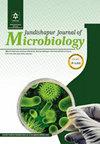Vitamin D Deficiency and Receptor Polymorphisms as Risk Factors for COVID-19
IF 0.5
4区 医学
Q4 MICROBIOLOGY
引用次数: 0
Abstract
Background: Early immune responses to COVID-19 can help eliminate the virus; therefore, strategies to improve the immune system have become important in disease prevention. Vitamin D plays a crucial role in the immune response to SARS-CoV-2 by increasing the expression of the vitamin D receptor. Objectives: This study investigated the impact of vitamin D deficiency, Fok 1, and Taq 1 Vitamin D Receptor (VDR) gene polymorphisms and comorbidities on the susceptibility to COVID-19. Methods: Fok1 and Taq1 polymorphisms were analyzed using the RT-PCR method, and vitamin D levels were measured using the chemiluminescence method. A total of 200 patients, 100 with COVID-19 and 100 without, provided blood samples for analysis. Results: The COVID-19 positive group had a significantly lower mean vitamin D level of 16.2 ± 11.3 ng/mL compared to the COVID-19 negative control group, 26.7 ± 15.9 ng/mL (P < 0.001). Individuals with a vitamin D level below 18.4 ng/mL had a 2.448 times higher risk of COVID-19 positivity (P < 0.001). There was no significant difference in the Fok1 and Taq1 gene polymorphisms between the two groups. (P = 0.548 and P = 0.098). The COVID-19 positive group had a significantly higher number of comorbid diseases with 40 (40%) compared to the negative group with 10 (10%) participants (P < 0.001). Conclusions: Levels of vitamin D above the cut-off value of 18.4 ng/mL were found to protect against COVID-19, while the presence of comorbid diseases was identified as a risk factor. However, no association was observed between the Fok1 and Taq1 polymorphisms and susceptibility to COVID-19.维生素 D 缺乏和受体多态性是 COVID-19 的风险因素
背景:对 COVID-19 的早期免疫反应有助于消灭病毒;因此,改善免疫系统的策略在疾病预防中变得非常重要。维生素 D 通过增加维生素 D 受体的表达,在对 SARS-CoV-2 的免疫反应中起着至关重要的作用。研究目的本研究调查了维生素 D 缺乏、Fok 1 和 Taq 1 维生素 D 受体(VDR)基因多态性及合并症对 COVID-19 易感性的影响。方法:采用 RT-PCR 法分析 Fok1 和 Taq1 多态性,采用化学发光法测定维生素 D 水平。共有 200 名患者提供了血样用于分析,其中 100 人患有 COVID-19,100 人未患有 COVID-19。结果显示COVID-19 阳性组的平均维生素 D 水平为 16.2 ± 11.3 ng/mL,明显低于 COVID-19 阴性对照组的 26.7 ± 15.9 ng/mL(P < 0.001)。维生素 D 水平低于 18.4 纳克/毫升的个体 COVID-19 阳性风险高出 2.448 倍(P < 0.001)。两组人的 Fok1 和 Taq1 基因多态性无明显差异。(P = 0.548 和 P = 0.098)。COVID-19 阳性组有 40 人(40%)患有合并症,明显高于阴性组的 10 人(10%)(P < 0.001)。结论研究发现,维生素 D 水平高于 18.4 纳克/毫升的临界值可预防 COVID-19,而合并疾病的存在被认为是一个风险因素。然而,在 Fok1 和 Taq1 多态性与 COVID-19 易感性之间未发现任何关联。
本文章由计算机程序翻译,如有差异,请以英文原文为准。
求助全文
约1分钟内获得全文
求助全文
来源期刊

Jundishapur Journal of Microbiology
MICROBIOLOGY-
CiteScore
1.30
自引率
0.00%
发文量
56
审稿时长
6-12 weeks
期刊介绍:
Jundishapur Journal of Microbiology, (JJM) is the official scientific Monthly publication of Ahvaz Jundishapur University of Medical Sciences. JJM is dedicated to the publication of manuscripts on topics concerning all aspects of microbiology. The topics include medical, veterinary and environmental microbiology, molecular investigations and infectious diseases. Aspects of immunology and epidemiology of infectious diseases are also considered.
 求助内容:
求助内容: 应助结果提醒方式:
应助结果提醒方式:


